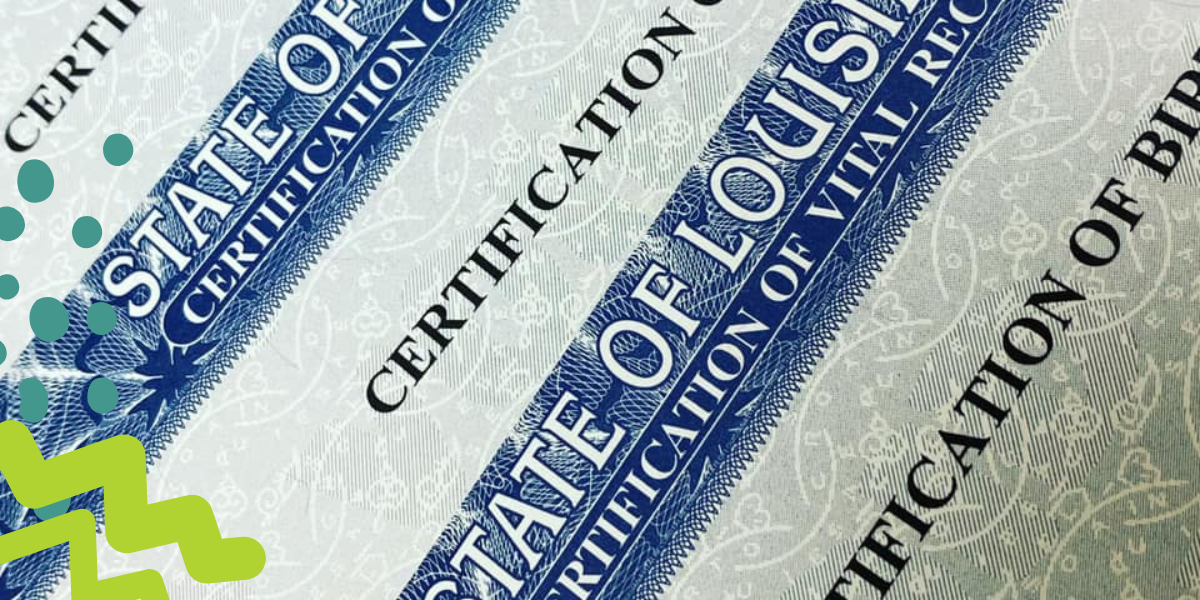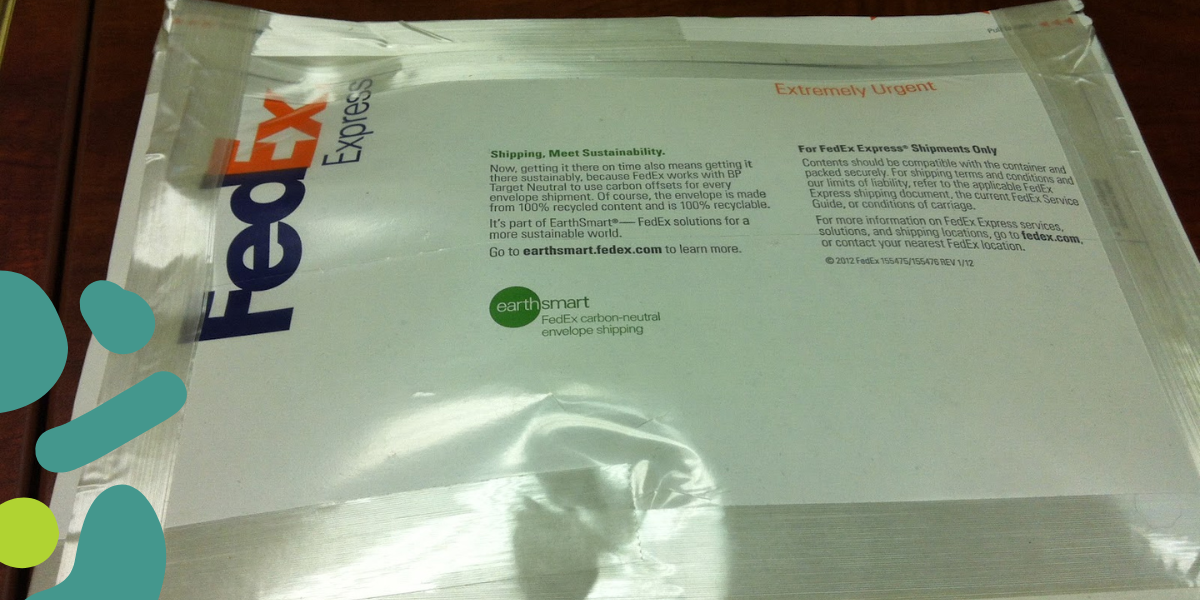
Two Perspectives: Original Birth Certificates for Adoptees
By Jess & Erin
April 14, 2023
10m read
The first piece of paperwork that acknowledges the beginning of your life is your birth certificate.
Adoptees have two different versions: They have an amended birth certificate that lists the adoptive parents as the parents and includes the name they have for the child. And they have an original birth certificate (OBC) – a birth certificate that lists the birth parents as the parents, is signed by the birth mother (or birth parents), and includes the child’s first given name (including the birth parents last name).
The original birth certificate is issued and usually only given to the adoption agency or attorney handling the adoption. It must be filed with the Court upon Finalization in order to amend the original birth certificate and issue a new one with new information. Most adoptive parents don’t know that the original birth certificate even exists, let alone ever see it or are given a copy of it.
Once the adoption is finalized, adoption records are sealed and unable to be reopened – including access to the original birth certificate – locking away a huge piece of adoptees’ story, history, and vital information that requires a court decision to unlock.
Currently, only 12 states allow unrestricted access to original birth certificates. 12 states allow adoptees access to their own basic information - the first piece of information about them.
18 states have restricted access, meaning either written consent from the birth parents, proof of their death, or a court order is required to provide an adoptee's original birth certificate. In the middle, 21 states have compromised access to original birth certificates. This means that in those 21 states there are laws regarding consent, age requirements, court orders and adoption registries that hinder an adoptee's ability to obtain their original birth certificate, often making it unattainable.
To find out what access your state allows, visit https://adopteerightslaw.com/maps/.
The History of Birth Certificate Legislation
Last summer, the State of Louisiana battled over a piece of legislation that would allow adoptees to have access to their original birth certificates at the age of 24 (24!) without having to petition the Court to unseal them. The bill was sponsored by Representative Chuck Owens, an adoptee, and received backlash and opposition from Louisiana Right to Life. LA Right to Life claimed to speak on behalf of all birth moms and stated that birth parents only chose adoption under the promise of confidentiality and that HB 450 would break promises made to birth mothers and violate their confidentiality.
This same fight began in Georgia this legislative session, with the introduction of Senate Bill 64. According to the Georgia Alliance for Adoptee Rights, “SB64 will restore a right that has been restricted since 1961: the right for all Georgia-born adult adoptees to obtain their own original birth certificate upon request. Georgia Alliance for Adoptee Rights has worked with bill author, Jim Outman, and the bill sponsor, Senator Randy Robertson (R-Cataula) to assure a “clean” and unrestricted bill.”
While this bill passed through both committee’s and the Senate, it failed to be introduced in the House for a vote - leaving Georgia adoptees to face another year without access to their original birth certificates.

Jess' Perspective
When I made the decision to place my daughter for adoption and terminate all of my parental rights, I did so with no promise of confidentiality and no expectation of such. As an adoption professional in the State of Louisiana, I was present for over 30 birth mothers signing their Voluntary Act of Surrender in 3 years and at no point was a promise of confidentiality brought up or requested.
This notion that birth mothers oppose adult adoptees' access to basic information via their original birth certificate is false, and if this is the misinformation being spread, my heart breaks for any woman that came to Louisiana Right to Life for guidance when facing an unexpected pregnancy.
As birth moms, we make decisions for our children before they are born, before they have a say in any decisions that affect them. We alter the course of their life before they have a chance to start living it. For years, they live their life in a home where no one looks like them because of the decisions we make. For 18 (in this case, 24) years, they are denied access to simple, basic, vital information. A single piece of paperwork that acknowledges their entry into this world, with the name of their biological parents.
As a birth mom who chose adoption, I will never oppose any state’s legislation that will allow more access to basic and vital information to adoptees. As much as we want a copy of our child’s original birth certificate, we want them to have it also.
Working as an adoption professional, I made sure to request 2 extra copies of original birth certificates- 1 for the child’s birth mother, and 1 for the adoptee. It cost $18 extra dollars, an additional check mark and made the world of difference. Not every adoption agency or attorney cares enough to think about things like that but I did. Because no adoptee should be denied access to the most basic information, the first piece of paperwork of their lives.
Most adoptive parents change their adoptee's names after birth, at the very least their last name is changed. But in some instances, a birth mother names their baby and that name appears on their original birth certificate. How can we deny adoptees the basic knowledge of the name their birth mother chose for them?
While Louisiana Right to Life was the main opposition to HB 450, the power behind them was a Louisiana based adoption agency. As adoptive parents, you have the power to make people listen with little to no work. You hold the power in the adoption industry, because you write the checks. You can be the change. Request the copies of original birth certificates from your adoption professional; when legislation like this comes up in your state, speak in favor of it, let your voice be heard. Adoptees deserve access to their original birth certificates.
Is there a place for confidentiality in adoption and a need to uphold a birth mother’s right to privacy? Yes. Is that place gate keeping an adoptee’s original birth certificate? No.
Birth mother’s deserve a right to privacy when it comes to medical records, finances, legal history, education, but not when it comes to original birth certificates.
Because, honestly, who does a birth certificate belong to? The one birthing, or the one being born?
Erin's Perspective
I still remember opening the door to find the FedEx delivery-person handing me an envelope from Michigan. When I opened it and pulled out the contents, my jaw dropped. It was Emerson‘s birth certificate, and it had me listed as the birth mother and my husband listed as the birth father.

A vague memory from the adoption finalization ceremony a few weeks earlier popped into my head. After the ceremonial hugs and tears, our adoption attorney excused himself moving toward the elevator bank with a giant stack of paperwork under his arms. “You’ll receive his birth certificate in a few weeks,” he said pressing the up button.
Standing in my kitchen, holding the amended birth certificate, I now realized that I’d naïvely assumed he meant that I’d be receiving his original birth certificate.
As I write this today – eight years has passed, and I realize that the amended birth certificate’s purpose has more to do with navigating the infrastructure of government documentation (getting an SSN, driver’s license, health insurance, a passport) vs depriving a child of their origin story.
In my perfect world, there would be room for an additional line on the original birth certificate. One that lists the child’s actual birth parents, and one for us as the adoptive parents. I’d be so honored to have my name listed under theirs.
In most cases, the only change is the child’s last name – similar to the process I went through when I took my husband’s last name. I didn't receive a new birth certificate when I changed from my maiden to married name. And in the same way I had to show my marriage certificate to get a new driver’s license, passport, etc, wouldn’t adopting families be able to present their adoption decree?
The OBC conversation tends to bring up another question as well: Who names the child? In both of our family’s adoptions, we had direct contact with the birth family from Day 1, which meant we had some incredibly raw conversations about everything from why they were choosing to place their child for adoption to their “absolute musts and must nots” for their child and more. (Sidenote: this is one of the reasons I’m an advocate for direct contact between families. If someone translates the words to an adopting family, the sentiment behind the words – which in some cases is more important than the actual words, can be lost.) In those conversations, we wanted to respect the birth family's wishes around the name, and so over the course of our conversations, we asked if they had a name in mind. In both cases, they said they wanted us to select the name. And in one case we chose a middle name that honored the birth family.
To that end, I strongly support an adoptee’s right to the original birth certificate. It’s part of their story. As a parent, my sole focus is ensuring my children have access to their story, and the support they need to reconcile it in the healthiest way possible.
…but until we have a better birth certificate solution, my advice to adopting families is to ensure the adoption professional handling your adoption finalization knows that you want both the original birth certificate in addition to the amended birth certificate.
To learn more about the fight to regain access to Original Birth Certificates, visit https://adopteerightslaw.com/truth/ .
 Jess & Erin Erin Quick is the CEO and Founder of PairTree, and more importantly, a two-time adoptive mother. Jess Nelson is the Community Manager at PairTree, as well as a birth mother. Together, they created the Two Perspectives series to take important adoption related topics and offer both of their perspectives - from two different sides of the adoption triad.
Jess & Erin Erin Quick is the CEO and Founder of PairTree, and more importantly, a two-time adoptive mother. Jess Nelson is the Community Manager at PairTree, as well as a birth mother. Together, they created the Two Perspectives series to take important adoption related topics and offer both of their perspectives - from two different sides of the adoption triad.


